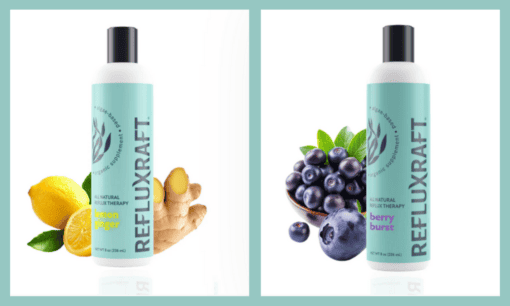If you have GERD or occasionally suffer from acid reflux or heartburn, chances are you’ve tried antacids like Tums or Pepcid, or even natural remedies like ginger, with inconsistent results. It also could seem like the options are either over-the-counter pharmaceuticals or all-natural alternatives.
But what if you didn’t have to really choose one or the other?
RefluxRaft is a natural, organic treatment for heartburn that uses alginate therapy to soothe reflux symptoms. And yes, it does work.
Here’s my honest review of RefluxRaft.
Topic Contents
RefluxRaft Overview
RefluxRaft is an alginate therapy-based reflux treatment. Unlike some other alginate therapies, RefluxRaft is all-natural and organic.
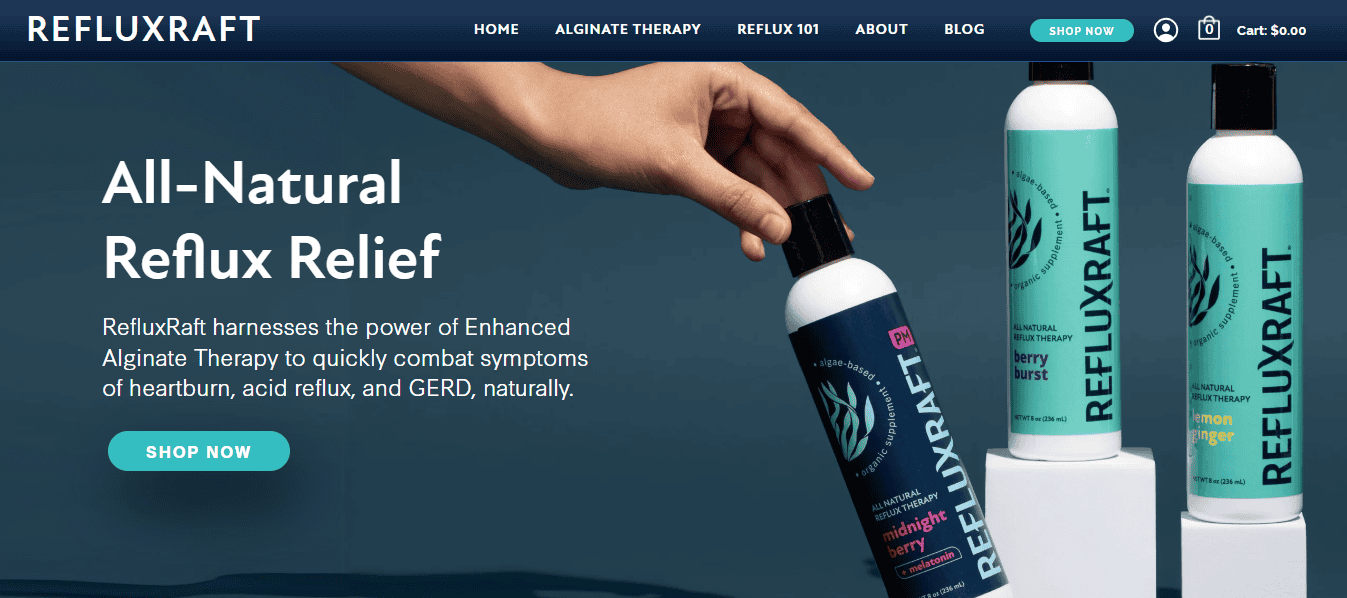
Developed by two otolaryngologists, RefluxRaft comes in a tube as a flavored gel (berry burst and lemon ginger). You take a teaspoon of it after each meal and before bed so it can get to work while you digest. It lasts up to four hours, so your symptoms are always in check.
They also have a “midnight berry” PM flavor, with melatonin added for a better night’s sleep.
How It Works
While other reflux treatments work to reduce the acid in the stomach, alginate therapies form a gel-like raft in the stomach that floats on top of the stomach contents, preventing it from rising into the esophagus and causing those heartburn symptoms.
It doesn’t kill the acid in your stomach or alter the way your stomach produces acid, which could cause rebound reflux or issues with nutrient absorption; instead, it lets your stomach produce acid and keep it from getting up to the esophagus.
RefluxRaft also contains calcium carbonate, sodium bicarbonate, and potassium bicarbonate; three acid-neutralizing agents for additional (and immediate!) reflux control.
You take a teaspoon after every meal, so that it can form that raft as you digest food. Then, it keeps lasting for up to 4 hours; just in time for your next meal and dose.
My Review of RefluxRaft
Overall, RefluxRaft gets an A from me.
The biggest pro here is, of course, the health implications. It actually works well and fast. The alginate-based therapy is clinically proven to be more effective than traditional antacids like Tums and has little to no side effects, so you don’t have to worry about acid rebound or issues with absorbing nutrients through your gut.
When I see “organic” and “natural,” my expectations for taste plummet. But this one didn’t disappoint. While it’s not quite a delicious sweet treat, the flavor I got (lemon ginger) is inoffensive and doesn’t taste grassy. The texture is also not too slimy, which was another concern.
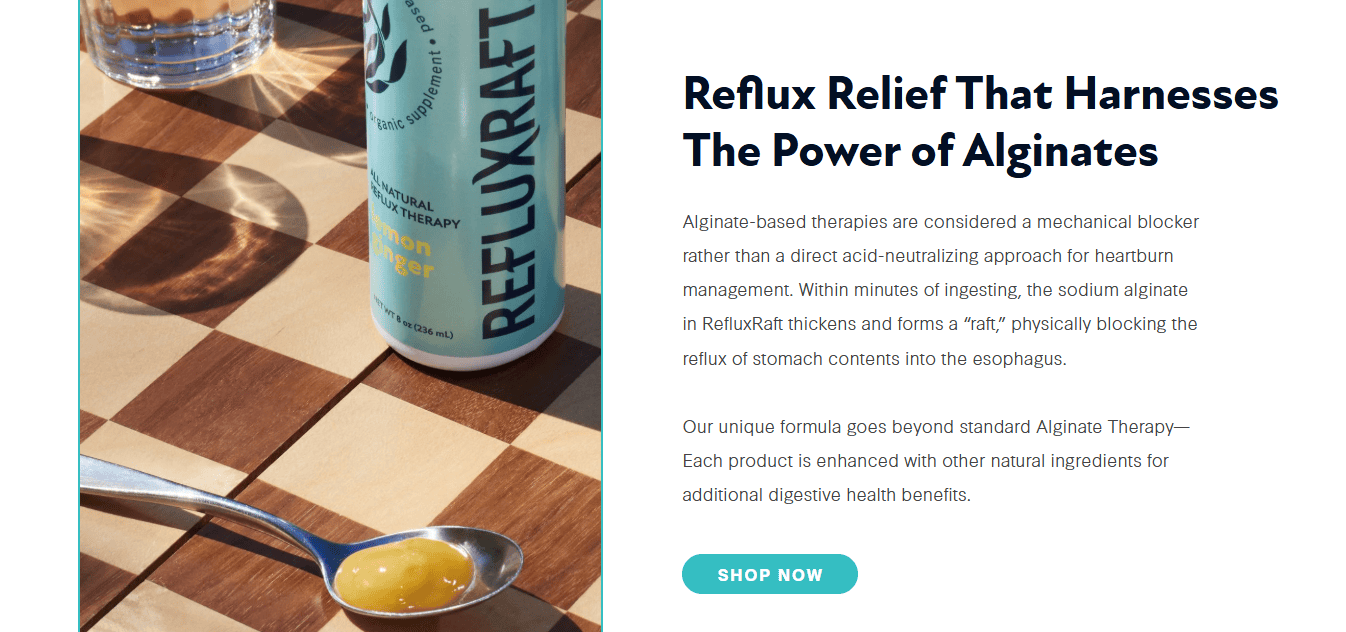
The biggest downside is the price. At a little over $30, RefluxRaft is more expensive than Tums or Pepcid, but not astronomically higher than many other reflux treatments. Remember, you’re getting a natural, organic alternative here, so the ingredients mean a higher price tag.
Aside from a lightly earthy/grassy aftertaste that easily goes away with a sip of water, RefluxRaft is an amazing and effective treatment for daily reflux issues.
Pros
RefluxRaft actually impressed me more than I thought it would. From being fast-acting and free of side effects to having additional acid-neutralizing power, it’s clear this reflux solution is overall a win.
- Easy to take- No pill to swallow or chalky tablet to chew, making it great for people who have a hard time taking pills.
- Organic- There aren’t many organic or natural reflux solutions, so finding this natural option is great.
- Effective- The raft is actually very effective. I don’t feel any of the effects of reflux whenever I take this as directed.
- Fast-acting- As soon as you take it (after meals), it gets to work. I don’t have to suffer through hours of symptoms before it starts offering relief.
- Taste- The lemon-ginger taste is exactly like those two things, masking the grassy algae flavor. It does taste a little bit more earthy, but the flavors are all-natural.
- No side effects- It doesn’t cause any rebound acid reflux, constipation, nausea, or any of the other side effects I often get with other antacids.
- Extra acid neutralizing- Aside from the alginate blend, RefluxRaft comes with calcium carbonate, sodium bicarbonate, and potassium bicarbonate for additional fast-acting acid neutralization.
- Low-calorie- One serving only contains 12 calories and 3 grams of carbs, making great for any kind of diet.
- Easy storage- When I first saw this, I thought it would need to be kept in the fridge, but it’s just fine at room temp.
- Extra stomach-soothing from ginger powder– The flavor I got (lemon ginger) comes with real organic ginger powder, which has additional stomach-soothing properties.
- Clinically-proven- Alginate-based therapies have been clinically proven to be more effective than traditional OTC antacids. While it isn’t regulated like a drug, the ingredients are considered safe for consumption.
Cons

Unfortunately, RefluxRaft isn’t without its drawbacks. From the higher price point to the need for frequent doses, some aspects that might make it less convenient than more traditional antacids.
- Price- Not the cheapest reflux option out there.
- Aftertaste- There is a slight earthy aftertaste; nothing awful, and much better than chalky Tums.
- Consistency- If you’re sensitive to gel-like food textures, this may not be the best option for you.
- Frequency- You have to take it after every meal and before bed, which may be more frequent than other antacids.
RefluxRaft vs. Other Reflux Treatments
How does RefluxRaft compare to other treatments? Well, we have to look at how each of them works.

- Alginate-based therapies: RefluxRaft is an alginate-based therapy, which is one of the less usual methods used in reflux treatments. It forms a gel-like raft on top of the stomach contents, preventing stomach acid from rising into the esophagus. These work fairly fast and provide lasting relief with no known side effects. Alginates include sodium alginate, calcium alginate, or alginic acid. Other alginate-based reflux treatments include Gaviscon (UK version), Enzymedica Heartburn Hero, and Reflux Gourmet (more on that later). They’re considered more effective than antacids but less effective than PPIs.
- Antacids- These are the most common OTC treatments for reflux. They neutralize stomach acid already present, providing fast but short-term relief. Side effects could include constipation, stomach cramps, nausea, and more serious conditions like osteopenia or aluminum toxicity. They use ingredients like calcium carbonate, magnesium hydroxide, aluminum hydroxide, and sodium bicarbonate, or combinations of them. Popular antacids include Tums, Rolaids, Alka-Seltzer Heartburn, milk of magnesia, and Mylanta. They’re the least effective of any on this list, but the immediate relief they provide makes them still helpful.
- Proton Pump Inhibitors (PPIs)- These are the better long-term solutions for people struggling with GERD. They reduce stomach acid production by blocking the enzyme system that produces acid, making them stronger and longer-lasting, but slower to work. Common side effects of these include diarrhea, headache, nausea, and more serious (but less common) side effects like deficiencies in vitamin B12, iron, and magnesium. Popular PPIs include Nexium, Protonix, Prilosec, and Prevacid. They are considered to be the most effective long-term treatment for GERD and chronic reflux issues.
- H2 Blockers– These work by blocking histamine receptors in the stomach lining, which reduces the amount of acid your stomach produces. They’re not as fast as antacids but kick in quicker than PPIs, and their effects can last several hours. Side effects include headache, dizziness, diarrhea, or constipation, though they’re mostly well-tolerated. Common H2 blockers include Pepcid (famotidine), Tagamet (cimetidine), and Axid (nizatidine). They’re considered a middle-ground option: more effective than antacids for prevention, but less potent than PPIs for long-term control.
RefluxRaft vs. Reflux Gourmet
From the same trusted alginate-based reflux treatment company, Reflux Gourmet is an alternative alginate gel formulated with a professional chef for an elevated culinary experience with the same effective acid-controlling properties as RefluxRaft.
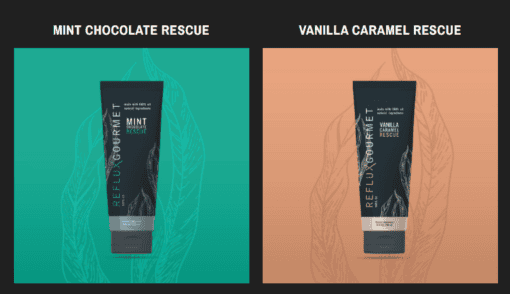
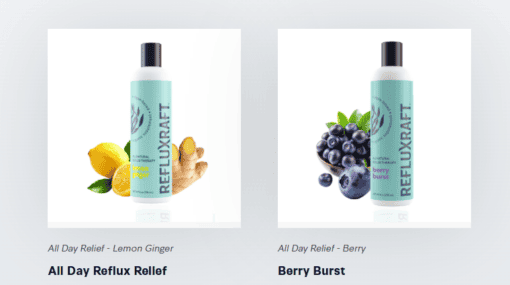
RefluxRaft is a more gelatinous consistency and comes in berry and lemon ginger flavors, while Reflux Gourmet comes in a smooth vanilla caramel or mint chocolate Rescue, as well as a gum in berry soothe or tropical soothe. Both are all-natural, but RefluxRaft is the only one that can claim the “fully organic” distinction.
Here’s how the two compare in other key aspects.
- Ingredients- RefluxRaft is organic and comes with 338mg of RefluxRaft’s Proprietary Alginate Complex (calcium carbonate, sodium alginate, sodium bicarbonate, potassium bicarbonate), organic vegetable glycerine, deionized water, organic deglycyrrhizinated licorice, organic ginger powder, and natural flavor. Reflux Gourmet comes with 425mg of Reflux Gourmet’s Proprietary Alginate Complex (calcium pantothenate, sodium alginate, sodium bicarbonate), dextrose, deionized water, natural flavor, grapefruit seed extract, and polylysine.
- Effectiveness- While Reflux Gourmet comes with a larger dose of alginate blend, RefluxRaft’s blend includes a wider variety of antacid ingredients. I’ve tried both and find them to be comparably effective in terms of how quickly they work and whether they provide complete relief from my symptoms. Both work quickly and both work well.
- Nutrition- RefluxRaft is 12 calories, 3g carbs, 0 sugar, 28mg calcium, and 20mg sodium per serving. One serving of Reflux Gourmet has 10 calories, 3g carbs, 3g sugar, and 40mg sodium. Neither is going to mess up your diet.
- Flavor- The lemon ginger RefluxRaft is generally inoffensive on the palate, covering up the grassy or earthy flavor of the alginate. It’s not crazy sweet or delicious, but it doesn’t make me cringe, either. There is a slight aftertaste, but again, nothing crazy. The vanilla caramel Reflux Gourmet, on the other hand, is absolutely delicious. It reminds me of a sweet caramel sauce you may get in your latte from a coffee shop, and feels like a little dessert after meals.
- Consistency- RefluxRaft is a thicker gel, kind of like hair gel. It slides down your throat easily and doesn’t stick in your teeth or mouth. Reflux Gourmet has a smoother, slightly thinner texture, like a traditional thick caramel sauce. It sticks around a little longer, but because the flavor is so good, I don’t care.
- Price- While the two are pretty close in price, RefluxRaft is $32.99 for an 8-oz tube with 47 servings, while Reflux Gourmet is $28 for a tube of the same size and $22 for a 30-pack of gum.
Both products will get the job done, so the choice really comes down to your personal priorities, whether that’s organic ingredients, taste, or price. No matter which one you go with, you’ll be getting an effective alginate-based reflux treatment that works immediately every time.
Alternatives to RefluxRaft
RefluxRaft may not be the best option for you. Here are a few alternatives that do similar things to what RefluxRaft does.
- Reflux Gourmet– Best natural, tasty alternative, closest comparison. Why: It’s the most similar to RefluxRaft in terms of therapy method, taste, and effectiveness.
- Gaviscon– Best for proven alginate-based relief. Why: Gaviscon uses the same alginate raft method that blocks acid from rising into the esophagus and has clinical evidence behind it.
- Tums– Best for cheap, instant symptom relief. Why: Calcium-carbonate antacids (the same ingredient found in RefluxRaft) neutralize stomach acid immediately and are widely available and cheap, making them a great choice for speedy symptom control.
- Pepcid– Best H2 blocker for preventing predictable heartburn. Why: H2 blockers reduce acid production and can be taken before meals to prevent heartburn before it happens.
- Omeprazole / Prilosec OTC– Best for long-term acid suppression. Why: PPIs reduce acid production more effectively and for longer than H2 blockers or antacids, and are usually taken if chronic reflux is the problem (not great for immediate relief).
- DGL (licorice)– Best for natural esophagus soothing. Why: DGL is used by some people to increase protective mucus and soothe the esophagus. Note that evidence is mixed, but it’s still a popular natural alternative.
- Slippery elm– Best natural coating for gentle relief. Why: Slippery elm can coat and soothe irritated tissue in the throat and esophagus. Clinical evidence on this one is limited, but a lot of people use it alongside other reflux meds for extra soothing.
Alt Protein Team is a team of professionals and enthusiasts committed to bringing you the most up-to-date information on alternative protein, health and wellness, workouts, and all things health-related. We’ve reviewed a lot of products and services so you don’t have to guess when you spend your hard-earned money on them. Whether you want to shed some pounds, build lean muscle or bulk, we can help you figure out what you need to do and what you need to have to achieve your goals.

